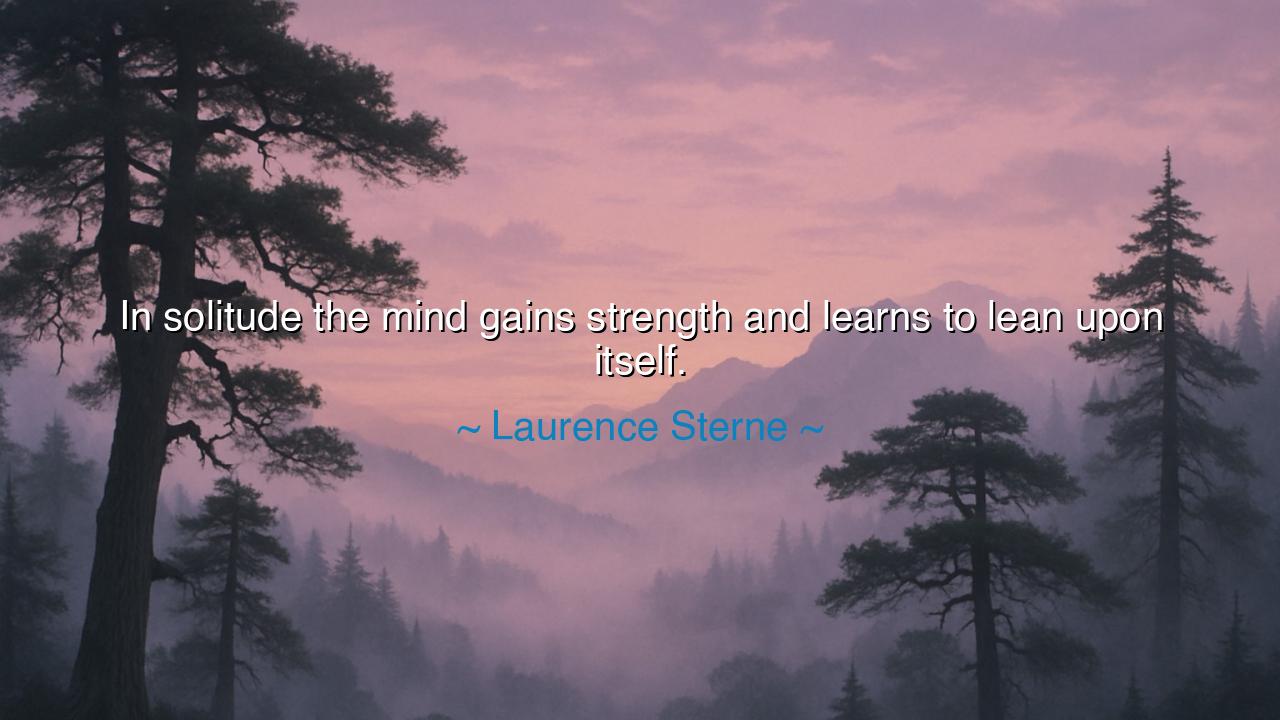
In solitude the mind gains strength and learns to lean upon






"In solitude the mind gains strength and learns to lean upon itself." These powerful words by Laurence Sterne speak to the transformative power of solitude—not as an empty space to be feared, but as a sanctuary in which the mind can find its true fortitude. In solitude, we are free from the distractions and influences of the outside world, and it is in this freedom that our inner strength emerges. The mind, without the noise of society or the expectations of others, is forced to turn inward and confront its own thoughts and beliefs. In that moment, it gains not only clarity, but a deeper sense of self-reliance, learning to trust its own wisdom and instincts.
The ancients understood well the power of solitude for personal growth. Socrates, though a man known for his public dialogues, often retreated to moments of quiet contemplation. His inner strength came not from external validation or the support of his peers, but from the solitude he cultivated to engage deeply with his thoughts and examine his own mind. Like Socrates, Plato saw the importance of withdrawing from the distractions of the world in order to engage with the truths of life. The idea that the mind grows stronger in solitude was a foundational belief among the philosophers, who saw the pursuit of wisdom as an inward journey, one that could only truly be undertaken in silence and reflection.
Consider the example of Diogenes, the ancient Greek philosopher who lived in a barrel and intentionally distanced himself from the comforts and distractions of society. Diogenes chose solitude as a path to self-mastery, rejecting the materialism of the world to focus solely on living in alignment with his values. In his isolation, Diogenes found strength—the strength to live authentically, regardless of societal judgment. Through solitude, he honed his mind, learning to lean upon himself and embrace the simplicity of life. His solitary existence was not one of misery, but of profound self-sufficiency and clarity of thought. Like Sterne's words, Diogenes understood that in solitude, the mind can become its own foundation.
Sterne’s quote also mirrors the teachings of Marcus Aurelius, the Stoic emperor who often sought solitude amidst the demands of ruling a vast empire. Despite his busy public life, Marcus wrote much of his Meditations in the quiet moments of his personal reflections, where he sought to understand his own thoughts and actions. In his solitude, Marcus found the strength to lead with wisdom, grounding his decisions in the quiet conviction of his own moral framework. His example teaches us that true strength—whether in leadership or personal growth—comes from within, and that solitude is the fertile ground where this inner strength can be cultivated.
The lesson here is profound: solitude is not a state of emptiness or loneliness, but a powerful tool for self-reliance and mental fortitude. When we allow ourselves the time and space to be alone with our thoughts, we confront the essence of who we are. In the silence, we are forced to listen to our inner voice, untainted by the opinions and pressures of the outside world. This practice is not a rejection of others, but a recognition that true strength comes from within, and that in moments of solitude, we reconnect with the core of our being. Like Socrates, Marcus Aurelius, and Diogenes, we too can find the wisdom to lead a purposeful life when we are able to trust and lean upon our own mind.
In practical terms, we must learn to value solitude, not as an avoidance of others, but as a tool for inner growth. Just as the ancient philosophers and leaders sought time for reflection, so must we carve out time in our daily lives to be with ourselves—whether through meditation, journaling, or quiet walks in nature. In these moments, we allow the mind to clear, to reconnect with purpose, and to find solutions that are rooted in our deepest values. By embracing solitude, we create the space in which our minds can strengthen, just as the body gains strength through physical exercise.
The ancient practice of solitude was never an escape, but a means to return to the center of one’s self. The journey of self-discovery, and the growth that follows, requires moments of silence, away from the expectations and influences of others. Just as the greatest philosophers and leaders of antiquity understood, the mind grows not by constant external validation but through self-examination, reflection, and contemplation. In solitude, the mind learns to rely upon itself, developing an unshakable inner strength that serves as the foundation for all actions and decisions.
In conclusion, Laurence Sterne’s words remind us of the timeless truth: solitude is not to be feared, but to be embraced as a path to inner strength. Like the ancient philosophers, we must find moments in our busy lives to step away, to reflect, and to cultivate the resilience that allows us to navigate the world with wisdom and clarity. By learning to lean upon ourselves, we become self-reliant, gaining not just strength, but the ability to face life’s challenges with confidence and courage. Let us, then, embrace the quiet, for it is in those solitary moments that we truly find ourselves and the strength to move forward.






AAdministratorAdministrator
Welcome, honored guests. Please leave a comment, we will respond soon